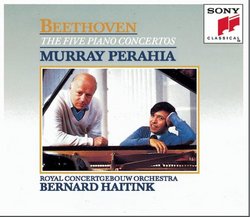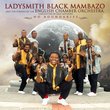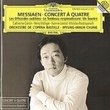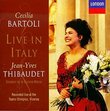| All Artists: Ludwig van Beethoven, Bernard Haitink, Royal Concertgebouw Orchestra, Murray Perahia Title: Beethoven: The Five Piano Concertos Members Wishing: 1 Total Copies: 0 Label: Sony Release Date: 10/25/1990 Genre: Classical Styles: Forms & Genres, Concertos, Historical Periods, Classical (c.1770-1830), Modern, 20th, & 21st Century, Instruments, Keyboard Number of Discs: 3 SwapaCD Credits: 3 UPCs: 074644457520, 1046170053056, 5099704457529 |
Search - Ludwig van Beethoven, Bernard Haitink, Royal Concertgebouw Orchestra :: Beethoven: The Five Piano Concertos
 | Ludwig van Beethoven, Bernard Haitink, Royal Concertgebouw Orchestra Beethoven: The Five Piano Concertos Genre: Classical
|
Larger Image |
CD DetailsSimilar CDs
Similarly Requested CDs
|
CD ReviewsThe best complete cycle. Alexander Leach | Shipley, West Yorkshire United Kingdom | 05/04/2001 (5 out of 5 stars) "Many recordings of the five piano concertos are available, to suit every taste and pocket. Complete cycles are usually on 3CDs, often with a price reduction over the separate issues, although some cycles are only available as a set, and not on individual CDs. Generally speaking, the most recommendable cycles are those by Perahia, Kempff, Fleisher, and Kovacevich. Alfred Brendel has recorded three cycles on Philips, but he is perhaps better attuned to the sonatas than the concertos. If one wants Brendel in these works, it is better to go for his cycle with Haitink than his live set from Chicago with Levine or the set with Rattle. Similarly, Pollini's earlier DG cycle is finer than his live recordings with Abbado.To obtain the very best recordings of these works it is necessary to buy separate CDs.The Piano Concerto No 1 in C major (in fact the second of the extant five to be composed) has been superbly recorded by Lars Vogt on EMI, coupled with an equally fine No 2. His playing is classically poised, with a vein of fantasy that brings both works to life, and he is ideally accompanied by the CBSO under Sir Simon Rattle. Another fine digital recording is that by Murray Perahia with Bernard Haitink conducting the Concertgebouw Orchestra. This Sony recording (from his complete cycle) is more traditional, and perhaps less individual than Vogt's, but enjoyable all the same. The coupling is again the Second Concerto, which is an even better performance than Vogt's: possibly the best in modern sound, in fact.The occasionally maligned Arturo Benedetti Michelangeli offers a highly individual account on DG: poised, often cool, but he gives one of the finest performances ever recorded of the first movement cadenza. The coupling is his equally idiosyncratic interpretation of the Third Concerto.The older (mono) cycle by Wilhelm Kempff on DG yielded an outstanding version of No 1, which is finer than the equivalent recording from his 1961 stereo cycle, also on DG. On the Philips label, Stephen Kovacevich gives highly spirited, occasionally even fiery, perfomances of Nos 1 and 2 that are typical of his entire cycle, which is good value at budget price. A similar interpretation of No 2, with perhaps greater subtlety, is provided by Leon Fleisher, coupled with his inpired No 4, on a budget price Sony CD. This is part of a cycle that is only let down by a rather lacksadaisical account of the First Concerto.The C minor Concerto (No 3) is a work in which many outstanding pianists have given of their best, among them Wilhelm Kempff, again from his 1953 mono cycle (which is only available as an integral set), Annie Fischer on DG under Fricsay in 1957, Daniel Barenboim on EMI with Klemperer and the Philharmonia (again, only available as a cycle), and Murray Perahia on Sony.An outstanding modern version is Mitsuko Uchida on Philips at full price, accompanied by Kurt Sanderling: spontaneous and powerful playing, with superb recording to match. Stephen Kovacevich's coupling of the Third and Fourth Concertos is fine value, if occasionally a little too unrelenting in its approach.The Fourth Concerto can lay claim to being the most profound of the five, and Leon Fleisher provides an interpretation which has never been equalled. The playing of the Cleveland Orchestra under George Szell is absolutely superb, and the 1959 recording, now on Sony, still sounds well. This remains one of the greatest piano concerto recordings ever made.Alongside Fleisher, most pianists fall short in the Fourth, but mention should be made of the great Emil Gilels, whose recording with Leopold Ludwig conducting the Philharmonia has been reissued on Testament, with a fine Emperor Concerto as coupling. Other recommendable Fourths include those by Perahia, Uchida, and Kempff (in stereo).The Fifth Concerto, the Emperor, remains the most popular, and has been recorded innumerable times. First choice is perhaps Murray Perahia on Sony. Wonderful playing, very much from the eighteenth century, and a finale that really sparkles, but which does not lack power. Beautiful sound too.Wilhelm Kempff's stereo DG account from 1961 is fine: magnificent playing throughout, with a sense of humanity in the Adagio that is compelling in its intensity. The finale is well paced: it is difficult to accept that Kempff was aged 65 when this recording was made.Michelangeli's DG recording with Giulini is not one of his finest; anyone wanting to hear Michelangeli in this work, one of his most famous interpretations, should seek out his 1957 Prague Festival performance on Praga, in remarkably fine sound. In his eighties, the late Claudio Arrau recorded a version of the Emperor Concerto on Philips that is nearly the equal of any other recorded in the digital era. Highly spontaneous, with a superb orchestral backdrop provided by the Staatskapelle Dresden under Sir Colin Davis.A remarkable performance of the work can be heard on a Piano Library CD: Walter Gieseking's 1944 Berlin broadcast in superb early stereo, which sounds remarkable in its clarity. This remains one of the most exciting Emperors ever, with the protaganists even ignoring audible anti-aircraft fire during the closing pages of the first movement." Perahia and Haitink at their best John Kwok | New York, NY USA | 04/12/2001 (5 out of 5 stars) "Murray Perahia makes a very persuasive case why he should be viewed as one of our finest interpreters of Beethoven. His technically perfect, yet vibrant performances of these concerti are second to none. I especially enjoyed his warm, enthusiastic playing of the 4th and 5th concerti, but he plays beautifully in the others too. Speaking of the 5th concerto, I can't think of a more regal performance, with the notable exceptions of the Arrau/Davis/Dresden Staatskapelle and Kovacevich/Davis/London Symphony Orchestra recordings. Perahia's trills in the 5th concerto sound as sweet as Arrau's and his playing is as lyrical as Arrau or Kovacevich. Haitink's conducting has never been better; indeed I believe that this - his third recorded cycle - is the best of the four he's recorded with Arrau, Brendel, Perahia and Schiff as soloists. Without a doubt, the Concertgebouw Orchestra plays as well as the Dresden Staatskapelle under Davis. Those in search of a definitive Beethoven piano concerto cycle won't be disappointed with this version." If I were to become deaf, this is what I would hear Musicus | 04/19/2003 (5 out of 5 stars) "This recording is simply amazing. The way Perahia plays each note in such a way that notes no longer exist but ooze out as sugary themes piqued by sweet harmonics which in themselves become the theme, over and over again, like undulating waves upon a lake. The 3rd and 4th are my favorites. The recordings are perfectly clear, limited only by your own hardware--speakers, wires, etc. The piano itself rings with perfect tonality. What can on say except that these recordings are sheer perfection. A definite buy."
|

 Track Listings (6) - Disc #1
Track Listings (6) - Disc #1





